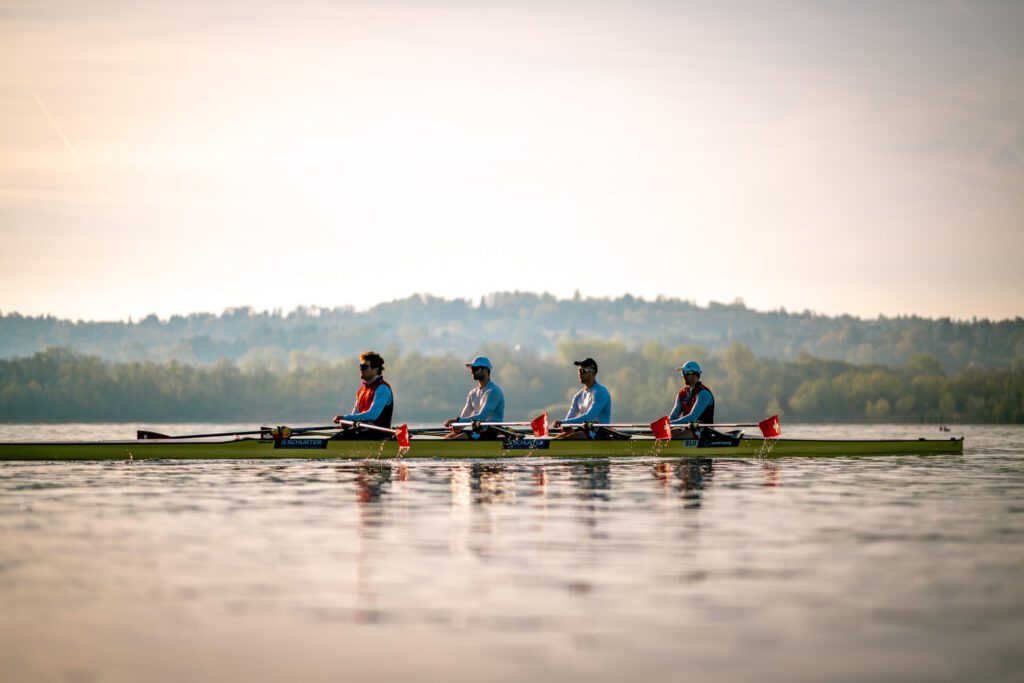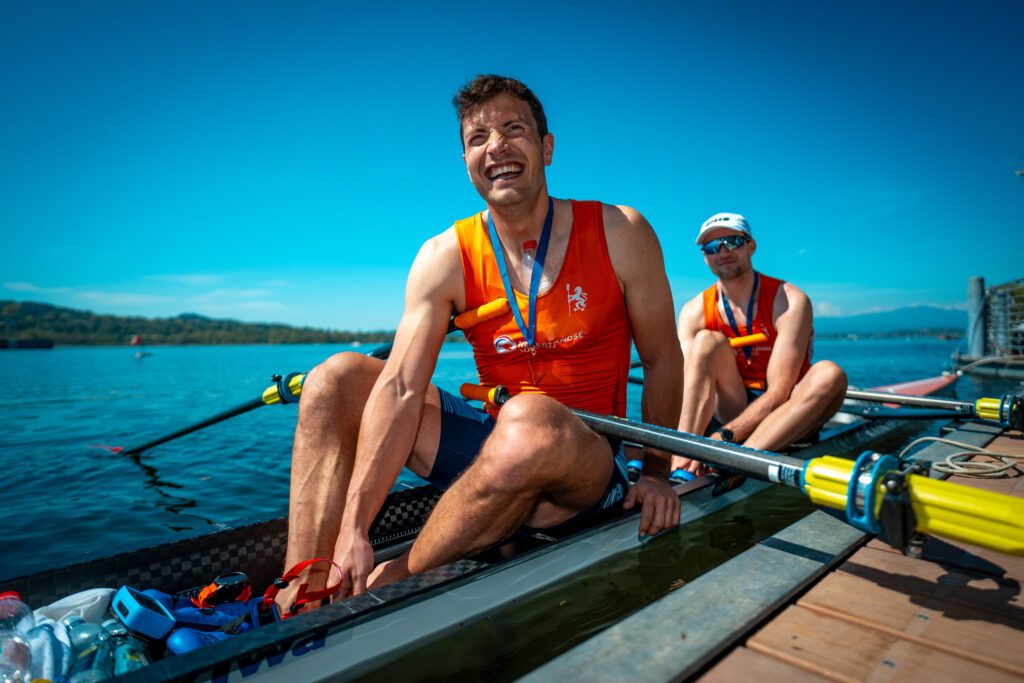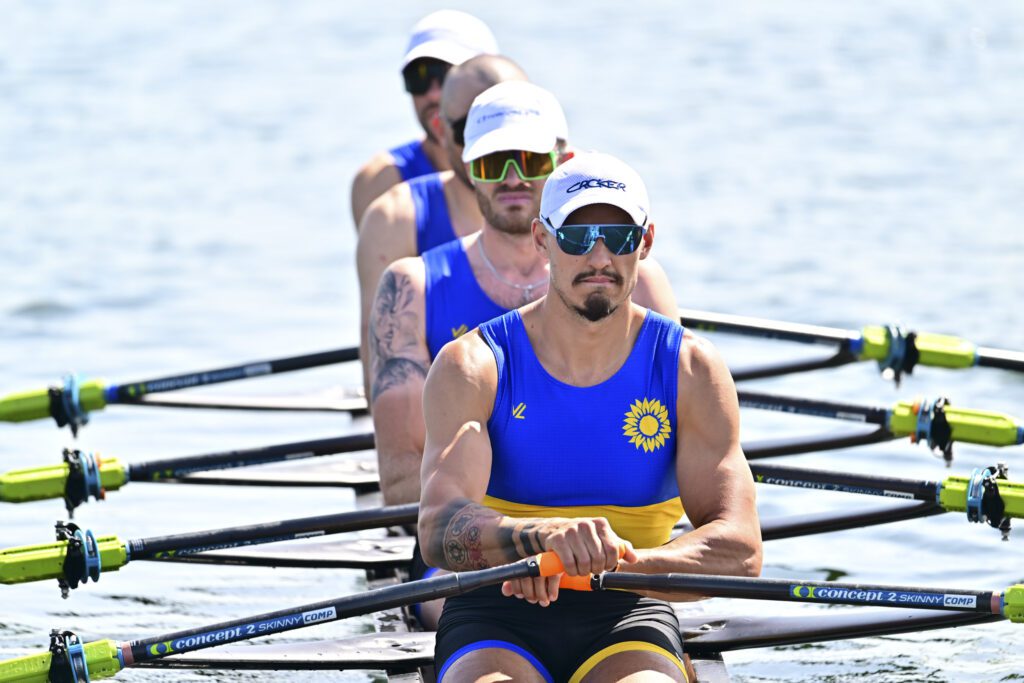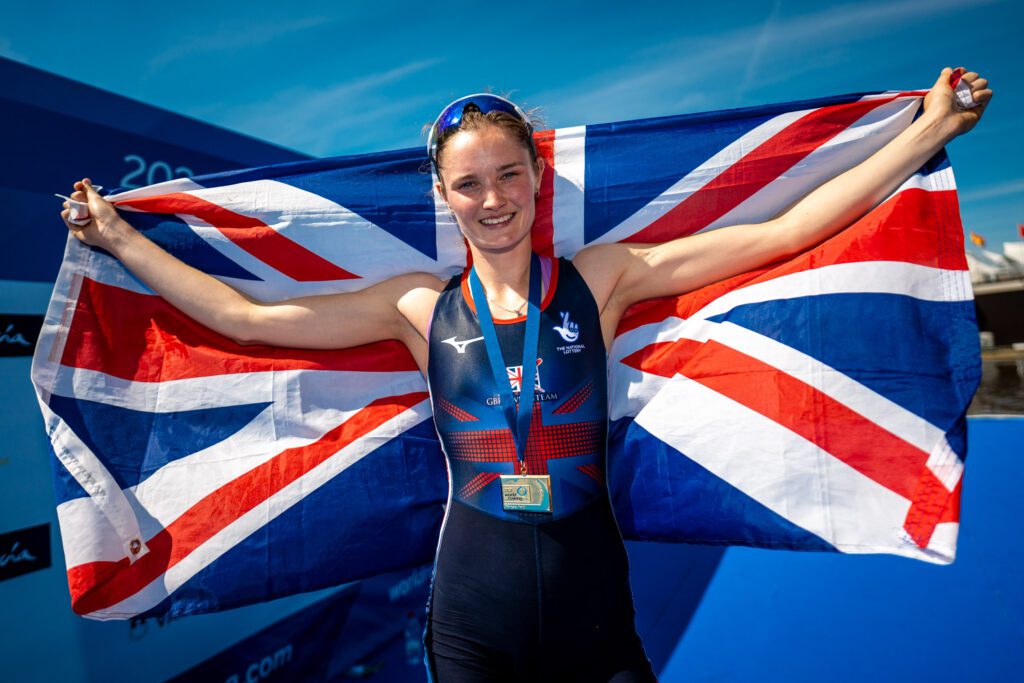For those who play Blazer Bingo at the Royal Regatta, 2019 offers a new twist: the smart uniforms of the King’s Cup crews’ mixed eights of serving armed forces officers who are competing for a 100th anniversary trophy cup to commemorate the 1919 Peace Regatta. Friday saw the first rounds of this event, which was drawn based on a speed order trial run last week, and following a few days of doing PR and enjoying the view of racing club crews, the forces boats got down to business.
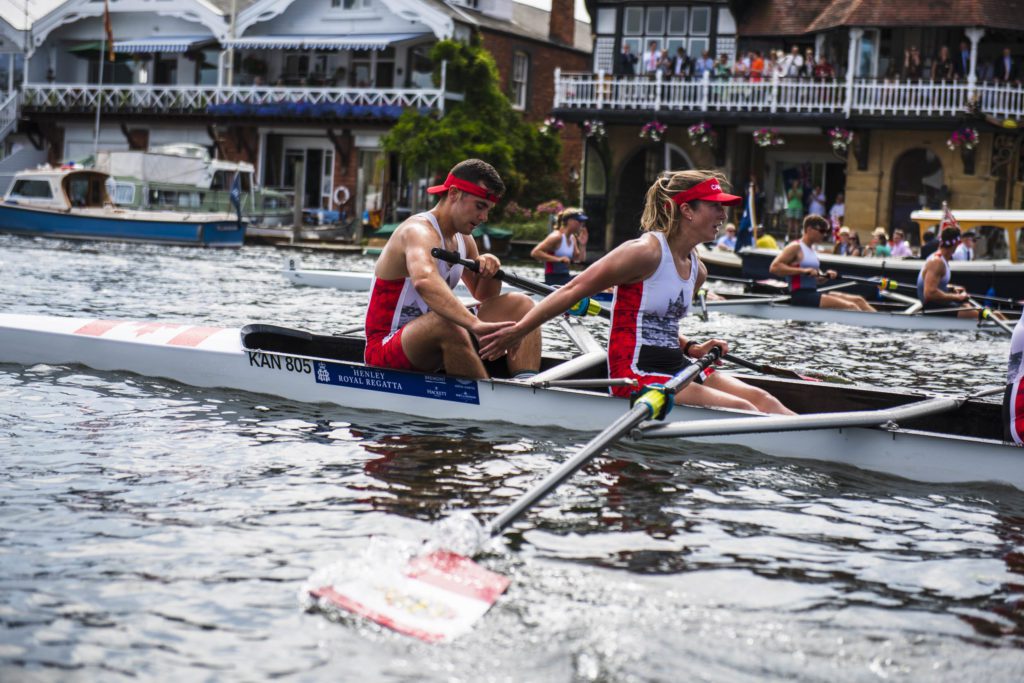
Photo Canadian Armed Forces // Henley Royal Regatta, Friday 5th July 2019
Credit Benedict Tufnell
The best race of the four quarterfinals was that between the French and British, in which les Forces Armées Françaises led the UK Armed Forces almost the whole way, but only narrowly, with a brief patch around Fawley when it looked as if the UK might squeeze through. From the Barrier times it looks likely that the Australians and Germans are the inherently faster crews, with the Australian Defence Force technically being the defending champions, having won the 1919 trophy, which now acts as their interstate championship eights prize each year. The new Cup, created to incorporate historic pieces of metal contributed by each of the eight nations into a winding River Thames design which meanders across the trophy’s surface, travelled to the UK with its own export licence in the cabin baggage of one of the Australian support team, and will stay at Henley after the regatta, while the winning crew will be given a ceremonial sword engraved with the result.
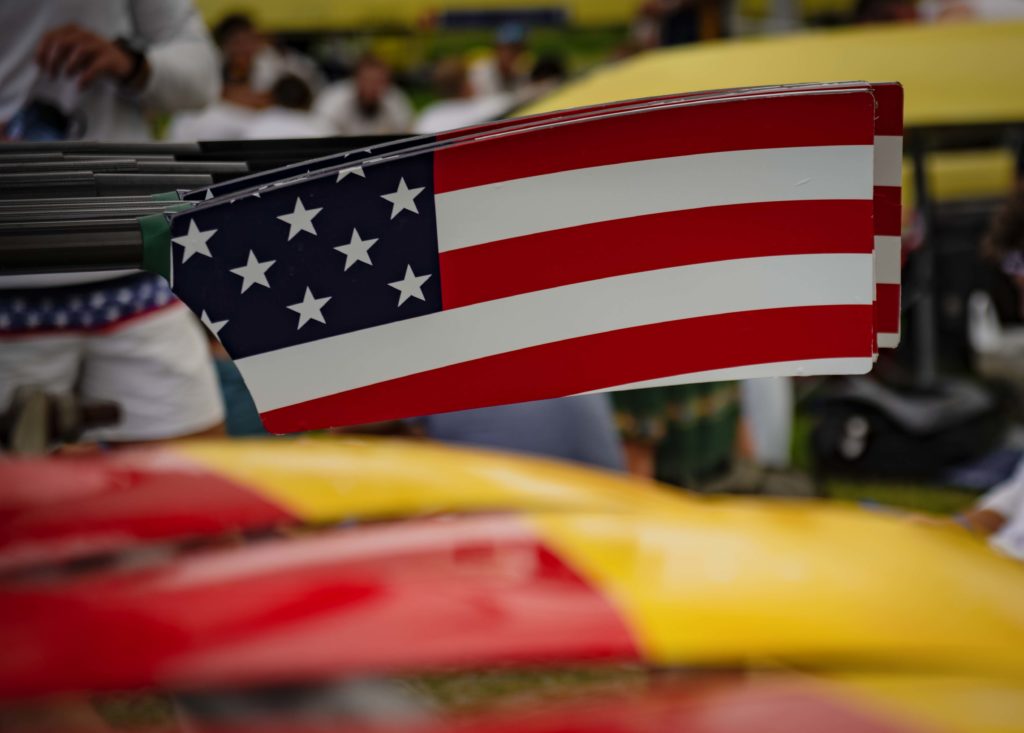
Photo The American King’s Cup blades // Henley Royal Regatta, Friday 5th July
Credit Benedict Tufnell
The American King’s Cup blades are fun: full-on Old Glory flags with the decals arranged mirror-fashion so that whatever side you look from (boat or blade) the stars are nearest the loom and it looks as if the flag is streaming away from the boat, as is required by the US Flag Code. However, the US flag isn’t ever allowed to touch the ground, so watch out for the crew taking blades straight from boat to rack, and presumably no clipping the booms is allowed.
That would have helped the Gloucester Diamond Jubilee quad, who hit the booms soon after halfway, offering Latymer B an unparalleled opportunity, which the Londoners seized. That puts them through to an Everest of a semi against National Schools champions Henley. There were other issues: Münchener clipped the booms too, which disrupted their rhythm and gave Thames A an easier than expected win, and the Leander women’s quad caught a crab while a length down at the Barrier to the Chinese National Team in the Princess Grace, handing the international team-members an extra advantage.
See day three at Henley, in pictures
The Boris Rankov umpiring saga continues: this may be his last year umpiring and Bonner Ruderclub seem to have set their hearts on forcing him to disqualify them: they steered over into Wairau’s water repeatedly during their quarterfinal of the Thames Cup, even though the New Zealanders were clear water down. His yells of “Bonn, Bonn, Bonn return to your station” started along the island, lasted more than a minute and then returned for a while at Fawley. Wairau obviously appealed, but had not shown enough early or late speed to convince Rankov that the actual outcome had been affected, and he turned the appeal down, despite commenting that Bonner’s steering had been “disgraceful”.
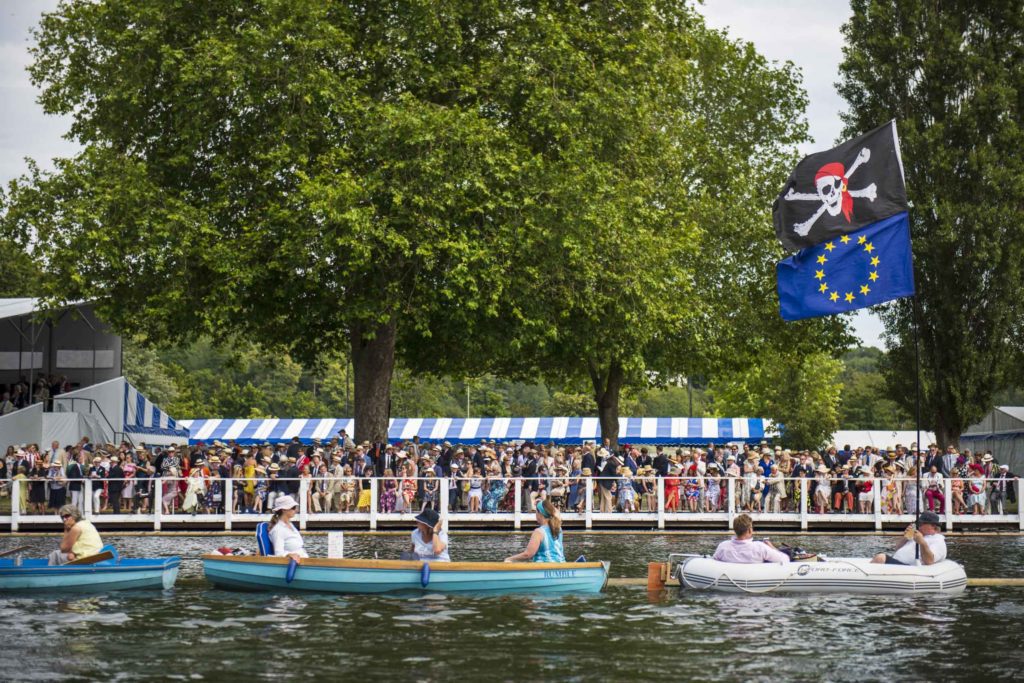
Photo EU flag over Steward’s Enclosure // Henley Royal Regatta, Friday 5th July
Credit Benedict Tufnell
That job dealt with, he turned his attention to the Germans, who came in for a thorough Rankov raking-down. Their cox tried to argue back that it hadn’t been deliberate, but he made it clear he was telling her off for ignoring his instructions and told her that if she carried on arguing (and interrupting him) he would red-flag her crew on the spot. The formal warning about steering was: “if you try anything like that tomorrow, you will be disqualified. Don’t you dare come across like that, and don’t you dare ignore the umpire. I don’t care if you’re 10 lengths clear, you stay on your side.” It is within the rules for the umpire to disqualify a crew if he thinks their interference with their opposition has been deliberate, even if he thinks that the outcome has not been affected. Their 5:30pm Saturday race against Okeanos, the controversial Dutch club which has both students and non-students amongst its members, will be under the spotlight, and Bonner, who are once again on Bucks, will need to lighten off with bow side if they can’t avoid veering any other way.
Records have been few and far between this week: conditions have been tailwind so far but not very strong, and quite a few crews got near but missed. However 2018 world silver medallists Kerri Gowler and Grace Prendergast snipped a second off their own Hambleden pairs record, and the nearly-anointed British U23 M4- (Cambridge Univ & Leander) came within a second of the Barrier record. The wind is due to veer round completely on Sunday to a head-wind, so Saturday will be the last chance for anyone to get themselves onto the back page of the programme, under “Fastest Recorded Times in Previous Regattas”. The King’s Cup are, of course, all new records, so for this once-a-hundred-years event, as we go into Saturday the Australians hold all the markers with 1-53 to the Barrier, 3-12 to Fawley and 6-53 to the finish, putting them roughly on a par with the quickest ever Remenham international women’s eights.
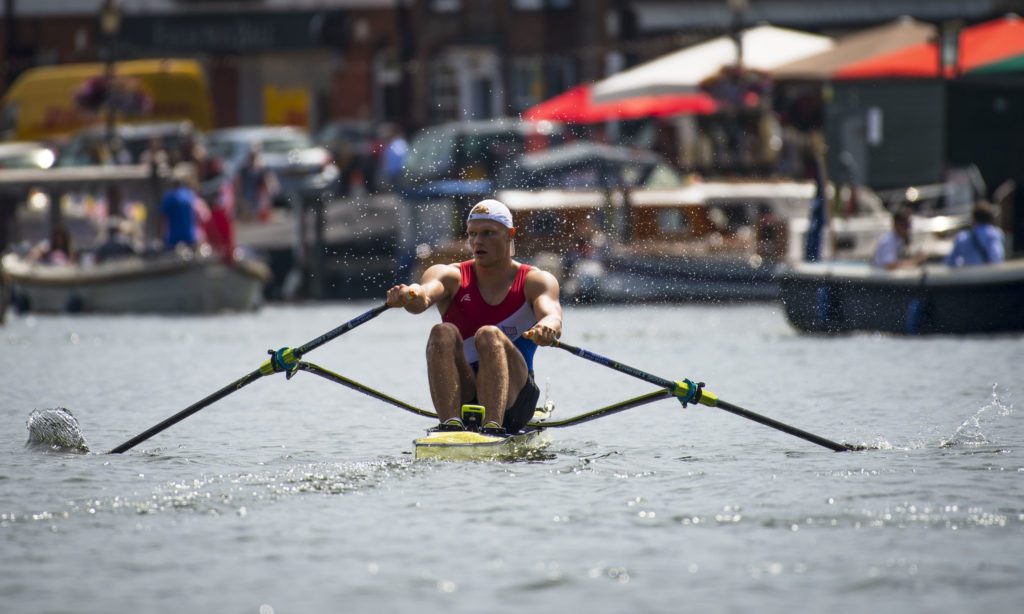
Photo Oliver Zeidler winning his race in the Diamond Sculls on Friday // Henley Royal Regatta, Friday 5th July
This year’s Diamonds contest seems to be full of surprises, and the next one was sprung as Guillaume Krommenhoek (first-ranked Dutch sculler, but C-final at Poznan, proved simply too strong for 2018 world champion Kjetil Borch, and the Norwegian shook his head as they stopped after the finish line, clearly not his best race. Krommenhoek now faces team-mate Luuk Adema, while in the other half of the draw Oliver Zeidler, who beat Swiss former lightweight Michael Schmid, will meet second-string GB sculler Harry Leask. Zeidler is over in Henley so that he can practice racing on bumpy water, the alert amongst international rowing having realised that the Tokyo Olympic course is likely to be quite windy, as indeed was Rio.
The Princess Elizabeth schoolboy eights were full of action, from Shrewsbury demonstrating that Scotch College Melbourne can be caught (RSS still lost but at least they had overlap), to an Eton/Radley thriller. Scotch had to get to within a second of the PE Barrier record to hold off the Shrewsbury crew, and Teddies also pushed St Paul’s creditably hard. However, St Paul’s failed to repay the compliment – holding their shell up suddenly after the finish line in order to avoid hitting a cruiser, they inadvertently backed down into the Teddies boat and stuck a dink in the bow canvas. St Paul’s weren’t having a perfect day – they were warned for coming across the stations around Upper Thames and had to stick the rudder on hard to steer back and avoid annoying the umpire (guess who?).
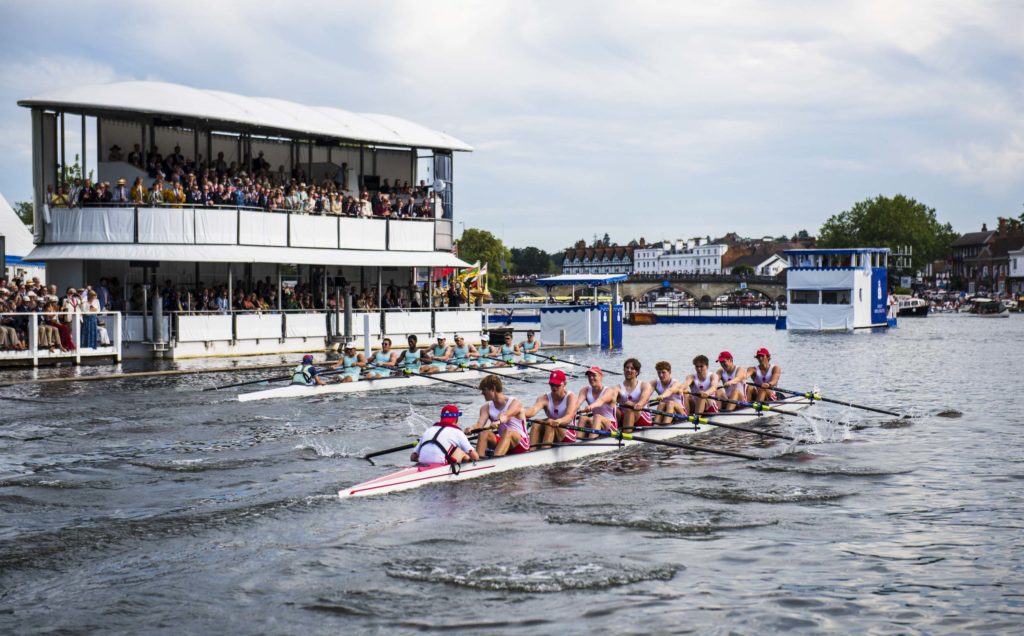
Photo Eton College beat Radley in the Princess Elizabeth // Henley Royal Regatta, Friday 5th July
Credit Benedict Tufnell
Newcastle University’s unselected Temple eight knocked out selected crew Brown on Friday (by three quarters of a length) for the second year running, and Leander’s Prince of Wales campaign ended in excitement as Skøll & Orca rowed clean back through them, despite coming well over onto Leander’s side and rowing in their wash at times. Had Skøll & Orca steered better they could have won by more than a quarter of a length, but as it was they found a better sprint than the Pink Palace, for the victory. In similar spirit (but with better steering and more serenely) Commercial rowed through Lyon’s Thames Cup crew, and University College Dublin overturned Düsseldorf & Crefelder in the Visitors’.
